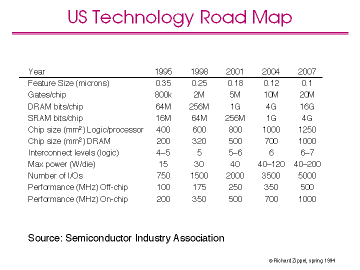
Back to the previous Slide, on to the Next Slide or up to the overview
While today's computers are fast and cheap, tomorrow's computers will be even more so. This chart summarizes the semiconductor industry's projection of the types of chips that will be produced over the next ten years. Computers built with these devices will greatly exceed even our wildest dreams.
And yet the world we thought these machines would enable has not arrived. Although the quality of some of our tools have improved, we still use computers in much the same way as twenty years ago. There have been some radical innovations, e.g. spread-sheets, but they are few and far between. We have failed to invent the new modes of computer usage that will change and improve society.
To a large degree we are elaborating on the systems ideas developed in the past, and studying problems that arose when creating systems years ago. Many of the constraints and problems that arose in these earlier days can now be resolved by brute force or can be sidestepped by using newer technologies. For instance, the Global Position System can now be used to guide cars around cities, or ships at sea eliminating the need for some other forms of navigation. In a sense we are guiding the direction of computer science research with our eyes firmly fixed to the rearview mirror.
By rethinking the foundations on which systems research is based, I believe we can free ourselves the pidgeon-holed problems that arose from earlier research, free ourselves to ask new, more revealing questions and free our imagination to use computing and information technology to better our lives and society.
Richard Zippel